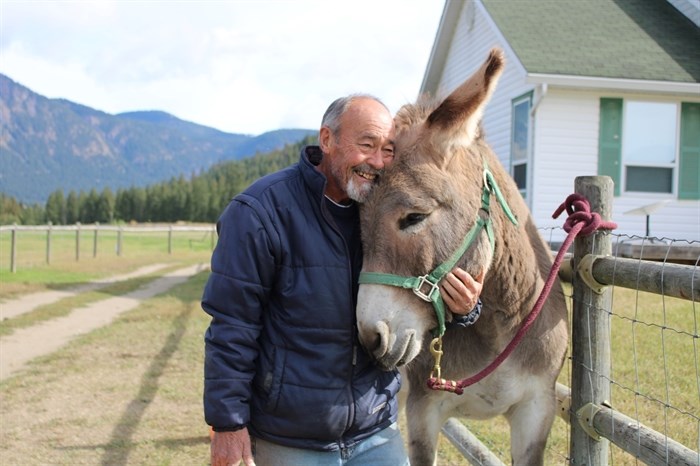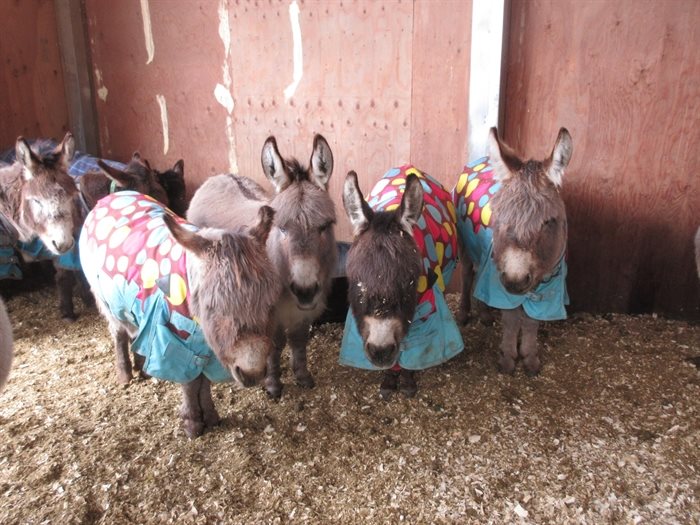What makes these senior rescue donkeys in Chase so special

Tucked on a farm in the Turtle Valley near Chase are almost 100 rescued donkeys.
With an average age of 28 years among the large herd, these donkeys are old and cold and require ongoing costly care, but co-founder of the Turtle Valley Donkey Refuge, Shirley Mainprize, said they are worth the work.
“They’re really smart and have an enormous capacity to love, making them great therapeutic animals,” she said. “We do palliative care where those people come spend time with them. We see how donkeys can show their love and give it. People understand after interacting with them.”
After spending over two decades taking in unwanted, mostly senior donkeys, Mainprize said the creatures are often misunderstood. In North America, much like horses, donkeys have become pets. People buy them because “they are amazing animals,” but don’t always know what they are getting into.
For starters, they can live to the age of 50.
“Donkeys often outlive their owners and most donkeys will have several homes across their lifespan,” Mainprize said. “You are buying a pet that is going to live at least 30 years. We think our future is secure but the reality is, people’s lives change.”
READ MORE: Triple amputee travels far for perfect pup at Merritt animal rescue society
In the past five years, most of the donkeys coming to the farm were seniors, owned by senior people. Senior donkeys require extra care.
“Senior donkeys age like just like we do and get health problems like dementia, heart problems, cancer and dental and physical issues, and all of that needs to be taken care of.”
Another common problem Mainprize comes across is the perception that donkeys are regarded as horses from a care perspective. Donkeys need a different diet and more protection from the weather.
“Donkey hair is like ours so it gets wet and they don’t take the cold because they’re supposed to be on the deserts of Africa,” she said. “They live on hot sand moving for food and their digestive system is setup for tiny bits every 15 minutes. Put a bale in front of them and they get obese quickly.”
Donkeys are gentle and intelligent, and have a memory as long as twenty years. Mainprize said it can take years for donkeys to trust humans after being abused.
“If they don’t agree with what we’re asking them to do we have a conversation with them and it becomes a gentle lesson,” she said. “They’re too strong to force them to do something, or drag them, but if they trust you they will learn the lesson and once they learn something they’ve got it.”
READ MORE: Penticton's famous Kevin the Goose survives another winter
Donkeys are very aware of their surroundings and will warn of danger by sending out a different type of bray with snorting and woofing. Some people think they are good at protecting sheep and goats but Mainprize said that depends on the donkey.
There are currently 98 donkeys at the refuge. A few died over the winter from age-related issues. It was a tough winter that settled in too quickly for the donkeys to acclimatize. When a donkey is too cold it stops drinking water and gets colic.
“We were putting blankets on them and it wasn’t helping some of them, so one night we had 23 donkeys in our heated infirmary,” Mainprize said. “You have to heat them up fast and put food and water in front of them.”
READ MORE: After years of working like a dog, Hawkes is retiring from the Vernon RCMP
Last year the crew renovated a barn and added heat and insulation. They started to expand further but were limited by supply chain issues and the early onset of winter. This spring they are going ahead with the insulated expansion to prepare for more similar winters and potential heat domes.
The refuge is holding a class in June about donkey care including a demonstration by a farrier and health staff mixing formulas for donkeys needing special diets. Mainprize wants to mitigate the lack of knowledge so “someday these donkeys don’t end up here.”
Donations to the refuge go to building infrastructure, hay for next winter and donkey health care. Volunteers are needed this year to plant trees, help with creek protection and manure management, and provide donkey care.
“Who doesn’t love a donkey, they are amazing animals and they articulate their love of humans,” Mainprize said. "They know my husband’s problems more than I do and they’ll stand there with you if you want a good cry.”
To contact a reporter for this story, email Shannon Ainslie or call 250-819-6089 or email the editor. You can also submit photos, videos or news tips to the newsroom and be entered to win a monthly prize draw.
We welcome your comments and opinions on our stories but play nice. We won't censor or delete comments unless they contain off-topic statements or links, unnecessary vulgarity, false facts, spam or obviously fake profiles. If you have any concerns about what you see in comments, email the editor in the link above.




